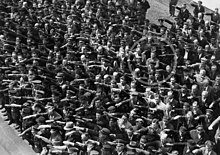August surveyor
August Friedrich Landmesser (born May 24, 1910 in Heidrege, a district of Moorrege , Pinneberg district near Hamburg ; † October 17, 1944 near Ston , Pelješac peninsula , Independent State of Croatia ; 1949 declared dead with death date August 1, 1949 ) was a German workers and Nazi victims.
biography
August Landmesser was the only child of August Franz Landmesser and Wilhelmine Magdalene, b. Schmidtpott. His first marriage was to Wunibalda Grundmann, who was born in 1907, and a daughter was born in Heidrege in 1929. In 1931 he joined the NSDAP together with his relatives on his mother's side . They hoped to get a job. Landmesser got engaged in 1935 to Irma Eckler, who was born in 1913, and left the party.
Due to the Nuremberg Race Laws , which actually only came into force one month later , the call for marriage was no longer accepted by the Hamburg registry office in August 1935. The relationship resulted in two daughters, Ingrid (born October 29, 1935) and Irene (born August 6, 1937).
Landmesser tried to move illegally to Denmark in early July 1937 . He was arrested and detained for a short time. It was then that Irma Eckler's second pregnancy became known, and in July 1937 a case of “ racial disgrace ” was initiated against Landmesser . On September 15, 1937, he was taken to the Fuhlsbüttel prison in Hamburg for pre-trial detention . In the trial, Landmesser was able to credibly argue that neither he nor Irma Eckler had known that she was a “full Jew”, and he was acquitted on May 27, 1938 for lack of evidence with the warning that in the event of recurrence he would face a prison sentence of several years.
Nevertheless, Landmesser continued the relationship with Irma Eckler and appeared with her in public. He was then arrested again on July 15, 1938 in the subsequent process to two and a half years prison sentenced and the prison camp I Börgermoor in Emsland spent.
Three days after Landmesser, Irma Eckler was also taken into so-called protective custody by the Gestapo for “racial disgrace” and taken to the Fuhlsbüttel prison. From there she was transferred to the women 's concentration camp in Lichtenburg and, after its closure in May 1939, to the women's concentration camp in Ravensbrück . A few letters from the concentration camp came from Irma up to January 1942, pointing to a growing estrangement from Landmesser. It is believed that Irma Eckler was brought to the Bernburg State Sanatorium near Dessau in February 1942 and murdered there - like over 14,000 other prisoners. On December 20, 1949, Irma Eckler was declared dead by the Hamburg-Altona district court , her death date being April 28, 1942.
Landmesser was dismissed on January 19, 1941 and from then on worked as a foreman in the Warnemünde branch of the Püst transport company. In February 1944 he was drafted into the Probation Battalion XIX / 999 , 3rd Company with field post number 39418D, where he was missing after fighting in Croatia and probably fell on October 17, 1944 during detachment movements near Ston . In 1949 he was declared dead by the Rostock District Court with a death date of August 1, 1949. In the summer of 1951, the marriage of August Landmesser and Irma Eckler was recognized by the Hamburg Senate . In the autumn of the same year Ingrid and Irene received their father's surname. Irene continued to call herself Eckler, however.
The children Ingrid and Irene were initially admitted to the city orphanage . The maternal grandmother finally got Ingrid to live with her, while Irene initially had to stay in the orphanage before she came to foster parents in 1951. After her grandmother's death in 1953, Ingrid also came to live with foster parents. She became a trained saleswoman, Irene first a bookseller, then a teacher.
There is a photo on which a crowd shows the Hitler salute. However, one person refuses to do so and crosses their arms. The identity of this man has not been established with absolute certainty. In the Berlin exhibition “Topography of Terror”, however, the explanatory text for the photo assumes that “probably August Landmesser” is the person who, as a “courageous nonconformist”, refused to give the Hitler salute.
reception
In 1996 Irene Eckler published the non-fiction book The Guardianship Act 1935–1958: Persecution of a Family for "Rassenschande" about the history of their family. The non-fiction book contains numerous documents from the period in question, from private letters from the mother to documents from government institutions.
literature
- Irene Eckler: The Guardianship Act 1935–1958: Persecution of a Family for "Rassenschande". Horneburg Verlag, Schwetzingen 1996, ISBN 3-9804993-0-8 ; New bilingual edition: A family torn apart by "Rassenschande": Political persecution in the Third Reich: Documents and reports from Hamburg in German and English. Horneburg Verlag, Schwetzingen 1998, ISBN 3-8012-3585-8 ( excerpts from the website of the research and work center “Education after / about Auschwitz” ).
Individual evidence
- ^ A b c A family torn apart from "Rassenschande": Political persecution in the Third Reich: Documents and reports from Hamburg in German and English. Horneburg Verlag, Schwetzingen 1998, ISBN 3-8012-3585-8 .
- ↑ SZ Photo Ikonen: Denial of the Hitler salute, 1936. In: Süddeutsche Zeitung Photo. December 9, 2016, accessed May 24, 2019 .
| personal data | |
|---|---|
| SURNAME | Land surveyor, August |
| ALTERNATIVE NAMES | Landmesser, August Friedrich (full name) |
| BRIEF DESCRIPTION | German workers and Nazi victims |
| DATE OF BIRTH | May 24, 1910 |
| PLACE OF BIRTH | Moor rain ( Pinneberg district , Schleswig-Holstein ) |
| DATE OF DEATH | October 17, 1944 |
| Place of death | Ston (Croatia) |

